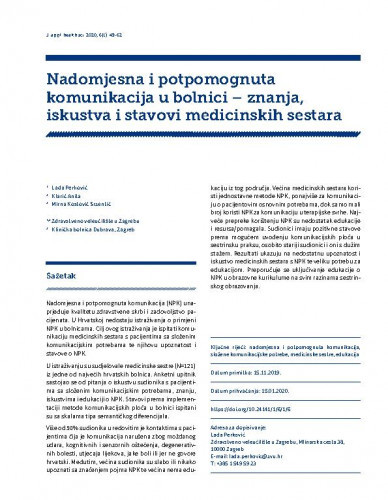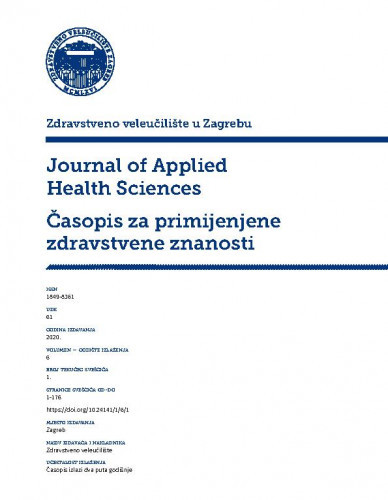Nadomjesna i potpomognuta komunikacija (NPK) unaprjeđuje kvalitetu zdravstvene skrbi i zadovoljstvo pacijenata. U Hrvatskoj nedostaju istraživanja o primjeni NPK u bolnicama. Cilj ovog istraživanja je ispitati komunikaciju medicinskih sestara s pacijentima sa složenim komunikacijskim potrebama te njihovu upoznatost i stavove o NPK. U istraživanju su sudjelovale medicinske sestre (N=121) iz jedne od najvećih hrvatskih bolnica. Anketni upitnik sastojao se od pitanja o iskustvu sudionika s pacijentima sa složenim komunikacijskim potrebama, znanju, iskustvima i edukaciji o NPK. Stavovi prema implementaciji metode komunikacijskih ploča u bolnici ispitani su sa skalama tipa semantičkog diferencijala. Više od 50% sudionika u redovitim je kontaktima s pacijentima čija je komunikacija narušena zbog moždanog udara, kognitivnih i senzornih oštećenja, degenerativnih bolesti, utjecaja lijekova, jake boli ili jer ne govore hrvatski. Međutim, većina sudionika su slabo ili nikako upoznati sa značenjem pojma NPK te većina nema edukaciju iz tog područja. Većina medicinskih sestara koristi jednostavne metode NPK, ponajviše za komunikaciju o pacijentovim osnovnim potrebama, dok samo mali broj koristi NPK za komunikaciju u terapijske svrhe. Najveće prepreke korištenju NPK su nedostatak edukacije i resursa/pomagala. Sudionici imaju pozitivne stavove prema mogućem uvođenju komunikacijskih ploča u sestrinsku praksu, osobito stariji sudionici i oni s dužim stažem. Rezultati ukazuju na nedostatnu upoznatost i iskustvo medicinskih sestara s NPK te veliku potrebu za edukacijom. Preporučuje se uključivanje edukacije o NPK u obrazovne kurikulume na svim razinama sestrinskog obrazovanja.; Alternative and augmentative communication (AAC) improves quality of patient care and their satisfaction. There is a lack of research about AAC in Croatian hospitals. The objective of this study was to explore nurses’ communication with patients with complex communication needs, as well as their knowledge and attitudes regarding AAC. Subjects were 121 nurses from one of the largest Croatian hospitals. Survey questionnaire consisted of questions regarding the subjects’ experience with patients with communication difficulties, their knowledge, experience and education about AAC. Attitudes regarding the implementation of communication boards in hospital were assessed with semantic differential type scales. Over 50% of the respondents were in regular contact with patients whose communication was disrupted due to the stroke, cognitive and sensory impairment, degenerative diseases, medication, severe pain or because they don’t speak Croatian, but yet the majority of the respondents are vaguely or not at all acquainted with the meaning of AAC and had no education about it. Majority of the respondents use simple AAC methods for communication about patient basic needs and only a small number of the respondents use AAC for therapeutic communication. Lack of education and resources / aids are perceived as major barriers. The respondents have positive attitudes about the possible introduction of communication boards or cards into their practice, especially older and/or more experienced subjects. Results indicates that nurses are in a great need for education about AAC. Education about AAC should be included in health communication curriculum at all levels of the nursing education.
Sažetak

 Journal of applied health sciences : Časopis za primijenjene zdravstvene znanosti : 6,1(2020) / glavni urednik Aleksandar Racz
Journal of applied health sciences : Časopis za primijenjene zdravstvene znanosti : 6,1(2020) / glavni urednik Aleksandar Racz